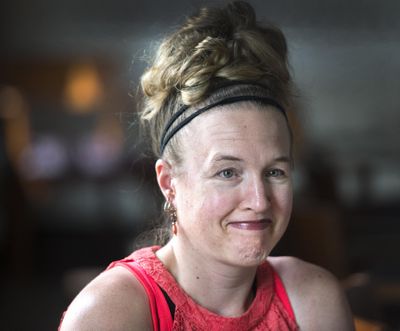This column reflects the opinion of the writer. Learn about the differences between a news story and an opinion column.
Shawn Vestal: New strategy helps Spokane fight homelessness

It might seem like a modest milestone, unless you’re one of the families passing it.
The city’s program for helping homeless families quickly get into a place to live has essentially eliminated its waiting list, meaning that families who seek help are connected with a case worker right away – rather than waiting between one and six weeks, which had been typical. This “point-in-time availability” grows out of a change in the way the city and local charities coordinate efforts to help homeless and near-homeless families – an effort that is separate from programs to help single homeless people.
Since January, Catholic Charities has operated a one-stop shop for families in trouble at the Myrtle Woldson Institute, across from the House of Charity shelter. At “the annex,” families are evaluated to see what they need and what they qualify for, and then connected with those services quickly.
Homeless families can get rental assistance and help finding a place, and families on the edge can get a variety of “diversion” services, including transportation and utilities payments, to keep them from slipping into homelessness. It’s the latest iteration of a long-term strategy that shifts delivery of services for the homeless from an older model with rigid program parameters and services spread among different agencies to a more flexible array of services that more directly provides the quickest, most effective help.
“Before, everything was siloed,” said Sharon Stadelman, the director of St. Margaret’s Shelter who oversees the Homeless Families Coordinated Assessment program. “Every single service had its own wait list.”
Catholic Charities took over the city’s assessment program in January, and one of the city’s goals in awarding it the grant was speeding up the Rapid Rehousing process. That program helps families living on the streets, in shelters or in cars get into a place to live quickly. The city announced its wait-list milestone earlier this month.
Jonathan Mallahan, the city’s director of Community and Neighborhood Services, said Spokane’s multitiered approach to homelessness – a combination of services that ranges from little help to big help, depending on what people need – is producing concrete results. The city’s one-day homeless count, which is an imperfect measure of a hard-to-quantify population, showed a 5 percent drop in the number of people “experiencing homelessness.” The number of families with children in the count dropped by 15 percent.
Mallahan said these figures come at a time when other cities are seeing an increase in homeless populations.
“This is absolutely part of an overall strategy to address homelessness in Spokane,” Mallahan said. “We can say with great confidence, especially with families … we’ve seen a decline in homelessness year over year.”
So far this year, Catholic Charities has assessed and helped 73 families a month, including families who enter Rapid Rehousing. Last year, more than twice as many families were seeking assistance – 185 a month. One reason for the decline has been a new diversion program, meant to prevent families on the edge from becoming homeless. Stadelman said that so far this year, 158 received help through this program that helped keep them from becoming homeless.
Spokane’s approach to homelessness has changed dramatically over the past several years, moving to a “Housing First” model that emphasizes getting people help quickly and with the “lightest touch” needed to solve their problem. This model is now built into federal grant programs and isn’t unique to Spokane.
But Stadelman, who has worked with the homeless in Spokane for 16 years, said the city is going through a time of particularly effective collaboration – with agencies and government officials coordinating efforts in a way that is new and effective.
“It’s been this amazing transformation,” she said.
The Woldson center, at 19 W. Pacific Ave., is one expression of that, she said. Catholic Charities bought the building and has been operating as a central intake point to evaluate and help families since January. It may seem like a small step, but it’s not. Reducing the number of places a family has to go for help, the number of people to see and forms to fill out, the number of bus rides between agencies, the number of waiting lists to sign up for – all of that helps stitch together a stronger safety net.
“I think it makes a big difference when you have everything in one hub,” Stadelman said. “It’s really, ‘You need help. We’re here to help you.’ ”
Shawn Vestal can be reached at (509) 459-5431 or shawnv@spokesman.com. Follow him on Twitter at @vestal 13.
